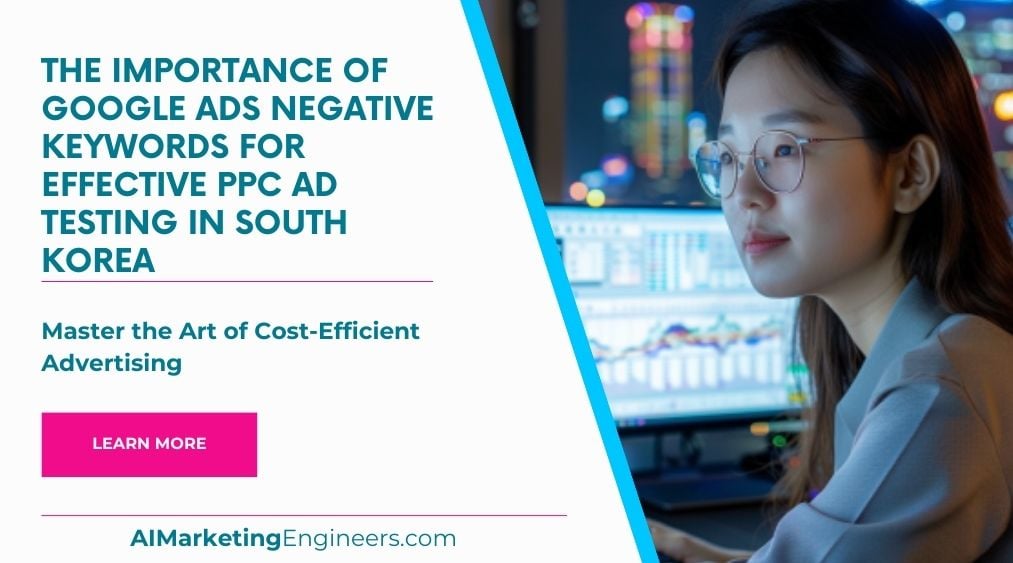Key Takeaways
✅ Strategic Budget Allocation: Did you know that businesses waste 25% of their PPC budget due to inefficient allocation? Discover how to strategically distribute your budget for optimal impact, tailoring your investment towards top-performing campaigns, and fine-tuning keyword selection for a significant ROI boost.
✅ Conversion Tracking and Optimization: With only about 22% of businesses satisfied with their conversion rates, learn how to track meaningful metrics that reflect genuine interest and conversion intents. Elevate your PPC success by optimizing Quality Scores for a healthy cut in your Cost Per Click (CPC).
✅ Independent Optimization Tools and Best Practices: Utilize tools like Optmyzr to refine bids based on hard data, avoiding the pitfall of relying solely on Google's automated strategies that over 42% of marketers question. Plus, adopt cutting-edge practices to minimize wasted budget and safeguard your ad spend.
![]()
Introduction
Have you ever considered how your PPC campaigns could be the powerhouse of your business's revenue? Whether you're new to Google Ads or looking to refine your approach, understanding how to optimize your PPC budget can be a game-changer. Are you tired of seeing your investment drain without the desired return?
In the ever-evolving digital marketplace, effective ad placement and conversion tracking are not merely technical processes; they are the lifeblood of all successful online advertising. This article is packed with innovative insights and professional techniques to not only save your budget from becoming another statistic of wasted spend but to turn it into a driving force for skyrocketing conversions.
Prepare to embark on a journey through the digital advertising landscape where you'll discover how to tackle the common issues that plague PPC campaigns. From allocating your spending to tracking conversions that matter, to understanding the inner workings of Google Ads, we're covering it all. Get ready to unlock actionable insights and groundbreaking strategies that will catapult your campaigns to unprecedented levels of efficiency and effectiveness. Stay with us, as we reveal the secrets to making every click count.
![]()
Top Statistics
| Statistic | Insight |
|---|---|
| Conversion Rate: PPC visitors are 50% more likely to purchase something than organic visitors. | This shows the high potential of carefully targeted PPC campaigns in driving sales compared to relying on organic search alone. |
| Ad Placement: 46% of clicks go to the top 3 paid ads on the search results page. | Being at the top matters. Position your ads effectively to maximize visibility and click-through rates. |
| Mobile Conversions: 70% of all paid search impressions are on mobile. | Mobile optimization is crucial, as the majority of ad views occur on mobile devices, where users are actively engaged. |
| Testing and Optimization Budget: Allocate 10-20% of your total PPC budget to testing and optimization efforts. | Invest in understanding what works for your audience. Iterative testing can refine campaigns and save money in the long run. |
| Google Ads Market Share: Google has a market share of 81.95% globally. | Google's dominance indicates that it's a platform where businesses can potentially reach a vast majority of their target market. |
Google Ads
When venturing into the world of Google Ads, managing your budget is like setting the sails for your marketing ship. Begin by setting a daily budget to maintain control, because even though winds can change, your limit gives you agency over the spend. If you're mapping out a broader course, your monthly budget, calculated by multiplying the daily limit by 30.4, keeps your campaign afloat over a predictable period. However, don't forget that selecting the right bid strategies, such as Maximize Clicks, is akin to choosing the right winds to ride – with automated bid strategies adjusting your path to achieve maximum results within budget constraints.
![]()
Placing ads effectively is no small feat. It's like finding the prime real estate in the world of digital impressions. By fine-tuning targeting options to match the ads to your ideal demographics and using ad extensions, you're effectively putting up a sign that's both larger and more engaging. A vital piece of this is landing page optimization; it's like ensuring your in-store experience matches the promise of your storefront - your conversion rates will likely soar if the landing page is relevant and inviting.
Diving deeper into campaign finest, establishing clear conversion goals is a beacon that guides your decision-making. Monitoring these goals with Google Ads conversion tracking becomes your compass to navigate the choppy waters of campaign optimization, giving you real-time feedback. Often, the secret to improving these numbers lies in relentlessly tweaking ad copy, refining targeting, and enhancing the landing pages to boost those conversion rates.
Allocating and managing your budget is hardly set-and-forget. Embrace the flexibility of shared budgets if you’re looking to spread your spend across various campaigns. Keep a keen eye on the horizon with budget alerts, ensuring that you remain on course, and make performance-based adjustments to investment as your campaign progresses, optimizing for a greater return on investment.
However, good sailors of PPC seas also know what icebergs to avoid. A too small budget may see your ads capsized by lack of visibility, while poor ad quality can lead to a drift in irrelevant waters, wasting precious resources. Regular campaign monitoring is a lifeline, helping to sidestep the peril of inadequate tracking and course-correct where necessary.
Pros employing best practices in campaign budget optimization always chart the historical currents – understanding past performance is invaluable for shaping future strategies. Many also lean on the advanced capabilities of Smart Bidding to harness Google's AI in steering bids effectively. And remember, marketing climates change with the seasons - adjusting for seasonality can be the difference between riding a wave or being caught in a marketing maelstrom.
![]()
AI Marketing Engineers Recommendation
Recommendation 1: Leverage Smart Bidding for Optimizing Your PPC Budget: Use Google Ads Smart Bidding strategies – like Target CPA (Cost Per Acquisition), Target ROAS (Return On Ad Spend), Maximize Conversions, and Enhanced CPC (Cost Per Click) – to automate bids and improve conversion rates. According to Google, advertisers that switch to automated bidding experience an average of 20% increase in conversions for the same cost. Align your PPC goals with the appropriate bidding strategy to maximize the effectiveness of each dollar spent.
Recommendation 2: Emphasize Mobile Optimization in Ad Placement: Prioritize mobile optimization as more users are searching on their phones. Recent studies show that 63% of Google’s US organic search traffic originated from mobile devices. Make sure your ads are formatted correctly for mobile, utilize mobile-preferred ad extensions, and consider the mobile user experience to enhance engagement. Track performance across different devices to understand where to invest your PPC spend for higher returns.
Recommendation 3: Integrate Google Analytics for Advanced Conversion Tracking: Set up Google Analytics in conjunction with Google Ads for a deeper understanding of post-click behavior. By enabling auto-tagging and linking Google Analytics to your Google Ads account, you gain access to in-depth data like average session duration, bounce rate, and pages per session, which are indicators of ad relevance and user engagement. Utilize the built-in conversion tracking features to track the entire customer journey and optimize ads for higher conversion rates. With precise tracking, you can tweak your campaigns based on customer interaction data, enhancing the ROI of your PPC spend.
Relevant Links
- Boost your conversions with expert PPC tactics!
- Learn the secrets to conquering China's premier social platform!
- Transform your SEO game with proven strategies for the German market!
- Unlock the cultural keys to winning over the Japanese market with ease!
- Discover winning e-commerce strategies to dominate the Russian online shopping scene!
Conclusion
In the competitive landscape of online marketing, optimizing your PPC budget is not just smart—it's critical. Setting a daily budget and understanding how it translates into a monthly expenditure gives you control over your finances, while carefully selecting bid strategies like Maximize Clicks can enhance your ad's performance within that budget. But spending money without targeting is like throwing darts in the dark. Precise targeting and the smart use of ad extensions can make sure your investment hits the bullseye, reaching the right audience effectively.
Now, let's talk about how our efforts turn into results. The purpose of Conversion Tracking isn't simply to count conversions—it's to understand them, to refine your approach. Defining clear conversion goals, and then meticulously tracking and optimizing for them, is like having a GPS for your PPC campaign, guiding you to your destination more efficiently. And don't forget the important task of landing page optimization–your ads are promising a destination, make sure it's one your audience wants to stay and engage with.
However, an optimized budget means nothing if it’s not managed well. Using tools like shared budgets and budget alerts can give your campaigns the flexibility and supervision they need. Performance-based adjustments ensure that your spending delivers the best possible return on investment, and this is where understanding the intricate details count. Avoid common pitfalls such as underfunding your campaigns, or skimping on ad quality, which can drastically reduce your potential reach and effectiveness.
Lastly, continuous monitoring of historical trends, adoption of smart bidding strategies, and adjusting for seasonality will keep your campaigns sharp and responsive. The best practices listed encourage a proactive rather than reactive approach to your PPC management.
By embracing a philosophy of ongoing optimization across ad placement, budget allocation, and conversion tracking, businesses can craft ad campaigns that not only speak to their audience but also resonate with them, leading to increased conversions and, ultimately, revenue. Consequently, keeping a finger on the pulse of your campaign's health with conversion rate optimization and thoughtful budget allocation is not just recommended; it's a necessity for success.
![]()
FAQs
Question 1: What's the deal with setting a Google Ads budget?
Answer: Think of your Google Ads budget like the cap on your daily spending. It's there to make sure your ad campaign doesn't go wild and spend more than you want it to in a day.
Question 2: How exactly does Google Ads figure out my budget?
Answer: Google Ads is all about daily budgets. To figure out your monthly spending, just multiply your daily number by 30.4—the average number of days in a month.
Question 3: Is there a smallest amount I gotta spend on Google Ads?
Answer: Nope, there's no strict minimum. But tossing in just a few bucks a day might not get you very far.
Question 4: Why should I bother with negative keywords?
Answer: Using negative keywords stops your ads from showing up in searches that don't match what you're selling. That means not throwing money away on clicks that won’t convert.
Question 5: Can ad extensions make my ad be in a better spot?
Answer: You bet. Ad extensions add more info to your ads, helping them stand out. The better your ads and landing pages match up, the more love they'll get from Google—and that could mean cheaper, better placements.
Question 6: What's conversion tracking all about?
Answer: It's like being a detective. Conversion tracking clues you in on what happens after someone clicks on your ad—like buying something or dropping you a line. It's all about measuring success.
Question 7: Smart Bidding—what's that fancy term mean?
Answer: Smart Bidding is like auto-pilot. You set the goals, and it adjusts your bids for you, aiming to get the best bang for your buck based on what you want to achieve.
Question 8: How does the time of year mess with my budget?
Answer: Well, your business might have its 'seasons'—times when everyone's looking to buy what you're selling. During those hot periods, you might want to pump more into your budget to catch the wave.
Question 9: Why use a shared budget?
Answer: Google's shared budget smarts can spread your money across several campaigns, aiming to give you the best shot at good results.
Question 10: What's with budget alerts?
Answer: Budget alerts are like a buddy giving you a nudge when you're about to overspend. They help you keep track so you can shift things around if needed.
Question 11: Should I be changing my budgets often?
Answer: It's all about what's working and what’s not. Roll with the punches—put more money into the stuff that's bringing in returns and cut back on the duds.
Question 12: How do I make my Quality Score better?
Answer: Spruce up your ads and your landing pages. The better your Quality Score, the less Google might charge you for a primo ad spot.
Question 13: What’s the average money business folks throw at Google Ads each month?
Answer: On average, businesses across different industries might spend about $2,266.7 each month.
Question 14: How can I keep an eye on how my ads are doing and what I'm spending?
Answer: Tools like AgencyAnalytics can help you watch your spending and check out how your ads have been doing over time.
Question 15: Got any tips for not blowing my budget on campaigns?
Answer: Totally. Know your sales cycle, play smart with strategic spending, use Smart Bidding, adjust for the season, and always base your choices on how well things are performing.
![]()
Academic References
- Google Ads Strategy 2024 Guide. (2024). In this comprehensive guide, the authors highlight key strategies for maximizing the effectiveness of PPC campaigns. They emphasize the crucial role of conversion tracking, use of ad extensions, and the necessity of ongoing optimization to ensure ads are placed effectively and budgets are allocated efficiently. Regular analysis and data-driven adjustments are pointed out as vital for improving campaign results.
- Maximize Your Google Ads Budget. (2023). This article offers a wealth of practical tips for budget optimization within Google Ads. By advocating for a disciplined approach to budgeting, targeting specific geographic locations, and strategically deploying the Google Display Network, the authors provide actionable insights for managing budgets. The piece underscores the importance of setting clear goals and closely monitoring campaign performance to manage budgets effectively.
- The Guide to Optimizing Google Ads for Higher Conversion Rates. (2024). The guide delves into tactics for boosting conversion rates in Google Ads campaigns. It underlines the necessity of clearly defining conversion actions, meticulously analyzing reports, and integrating campaigns with Google Analytics. Emphasis is placed on tracking essential metrics, such as clicks, impressions, and conversion rates, to fine-tune advertising strategies and enhance ad performance.
- Manage Your Google Ads Budget for Optimal Performance. (2023). In this critical discussion on budget management, common pitfalls affecting Google Ads expenditure are explored. The authors provide targeted solutions to issues such as underspending, low click-through rates (CTR), and imprecise targeting. Recommendations include bid adjustments, keyword expansion, and ad copy optimization to address these challenges.
- How To Create a Google Ads Budget & Bidding Strategy. (2023). The focus of this article is the strategic monitoring of campaign and ad-level costs, alongside keyword expenditure analysis and shopping performance evaluation. It advocates for a bespoke approach to budget and bidding strategies within Google Ads, tailored to meet the unique goals of each client. Emphasizing a meticulous, data-driven methodology, this resource is pivotal for marketers looking to optimize their PPC investments.





